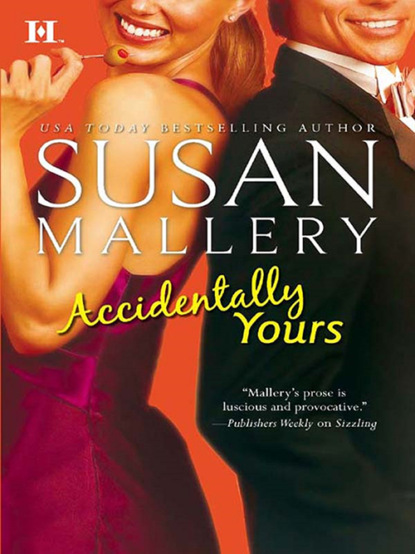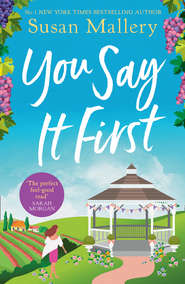По всем вопросам обращайтесь на: info@litportal.ru
(©) 2003-2025.
✖
Accidentally Yours
Автор
Год написания книги
2018
Настройки чтения
Размер шрифта
Высота строк
Поля
“I don’t know.” He pulled a business card out of his wallet and put it on the counter. “This is my direct number at work and my cell number. If you need to get in touch with me.”
She picked up the card and waved it. “How much would a tabloid give me for these phone numbers?” she teased.
His eyes narrowed. “That is confidential information.”
“So I can call whenever I want, right?”
He picked up his jacket and walked to the front door without speaking.
“Okay, fine. I won’t play fast and loose with your personal info. Do you need my phone number?”
He turned back to her. “I have a file on you, remember?”
“I try not to.” She glanced at the clock on the wall. “Cody will be home in a few minutes. You could stay and meet him.”
“No, thank you. I have to be back in Seattle.”
Translation—he wasn’t interested in her son. She reminded herself he’d given her the money and she owed him. “Then I’ll just be here, quivering in anticipation of your phone call.”
One corner of his mouth twitched. “If only that were true.”
DR. ABRAM WALLACE SLAMMED shut the door to his truck and walked into Bill’s Food and Feed to pick up his weekly order. Bales of hay topped by bags of dog food stood to the left of the open double wood doors. On the right a galvanized tub held ice chilling imported asparagus and a basket of hothouse tomatoes. Bill catered to everything that ate—human and animal alike.
Abram stuck his hands in his coat pockets as he walked and kept his head down. He nodded as he passed a couple of women talking, then moved straight to the counter.
“Hey, Professor,” Bill, a large man in his fifties, called out. “I got your order all ready. Looks like Linda’s making you meat loaf. Lucky guy.”
Linda, Abram’s assistant, hadn’t mentioned making dinner, but it was something she took on once or twice a week. He didn’t pay attention to food and only ate because it allowed him to keep working. If it was up to him, he’d eat the same thing day after day. But Linda insisted on variety and making homemade meals so he wasn’t always heating up something from a can.
“You must be excited,” Bill said as he passed over a large box containing Abram’s order. “About the money for the research facility. Nathan King’s giving you fifteen million dollars.”
Abram gave him a blank look.
“You haven’t heard?” Bill paused. “You know, so you can start up again. Healing those sick kids.”
Abram avoided newspapers and he didn’t own a television. Linda kept him informed of any major events and reminded him to vote every few years.
“I don’t know what you’re talking about,” he grumbled. Money? For research? He’d closed down the lab years ago. After the fire, he’d had to. There was no going back. He couldn’t do that again. Couldn’t take the chance.
“You’re going to open the lab,” Bill insisted. “With the money. Everyone’s talking about how it will save the town.”
Abram took his order and left. Fool, he thought as he retraced his steps to his car.
There was no saving Songwood. It was too late for both of them. Linda had asked him once why he stayed. He hadn’t answered her, but he knew the reason. He’d killed the town. The least he could do was stick around and die with it.
“YOU’RE AN IDIOT,” Jason Hardy said as he led the way into a small conference room.
“So you’ve said.”
“Just trying to do my job. You shouldn’t have gone up to Songwood by yourself.”
“You’re repeating yourself,” Nathan told him as he walked over to the table against the far wall and poured himself a cup of coffee. “At what you make an hour, you should be more original.”
“You’re not cooperating,” Jason muttered. “I have a bad feeling about all this.”
Nathan reached for the container of cream, then paused as he remembered Kerri Sullivan hoarding milk for her son. As if milk was hard to come by. Although given her paycheck and her medical expenses, perhaps it was a luxury.
He remembered his mother complaining about the amount of food he’d put away when he’d been a teenager. But there had been affection, at least from her. His father was another story.
Involuntarily he turned to look out the window. The conference room offered a sweeping view of Puget Sound, including the spot where Nathan’s towers would go. Too bad his old man wasn’t around to see them built. Not that the dead could ever admit they were wrong.
“If word of this gets out, you’re screwed,” Jason said.
Nathan shrugged. “It’s a calculated risk. There’s a confidentiality clause in the paperwork. Kerri and I will keep silent. And you’re bound by client privilege. Who else is going to know?”
“I don’t like it,” Jason told him. “You should have let me handle this.”
“It’ll be worth it.” Nathan sipped his coffee. “The fifteen million means nothing to me. If using Kerri Sullivan and her kid gets me my permits, I’m happy. If I’m happy—”
“I’m happy,” Jason said with a shrug. “You’re the boss. I just worry you’re getting in over your head with her.”
“Kerri? No way. She’s nobody. A hairdresser.”
“She was capable of getting you to back down and hand over fifteen million. Just be careful.”
Nathan appreciated the sentiment, even as he found the idea of Kerri having any impact on him laughable.
“How long have you known me?” he asked Jason.
“Seven years. Close to eight.”
“How many times have I screwed up?”
“None.” His attorney nodded. “I agree with what you’re saying. Just be careful.”
“You’re paranoid.”
Jason grinned. “That’s why I make the big bucks.”
There was a knock at the conference door and then Kerri stepped inside.
She wore a dress and high heels, surprising Nathan. Her hair hung loose and she’d put on makeup. She was still farm-girl pretty. Not his type. But she would make a good impression on the people who mattered.
Nathan ignored her and glanced at Tim, who stood behind her.
“Any trouble?” he asked his driver.
Kerri sighed. “I was a very good girl. I was ready on time and I told funny stories nearly the whole ride here.”













